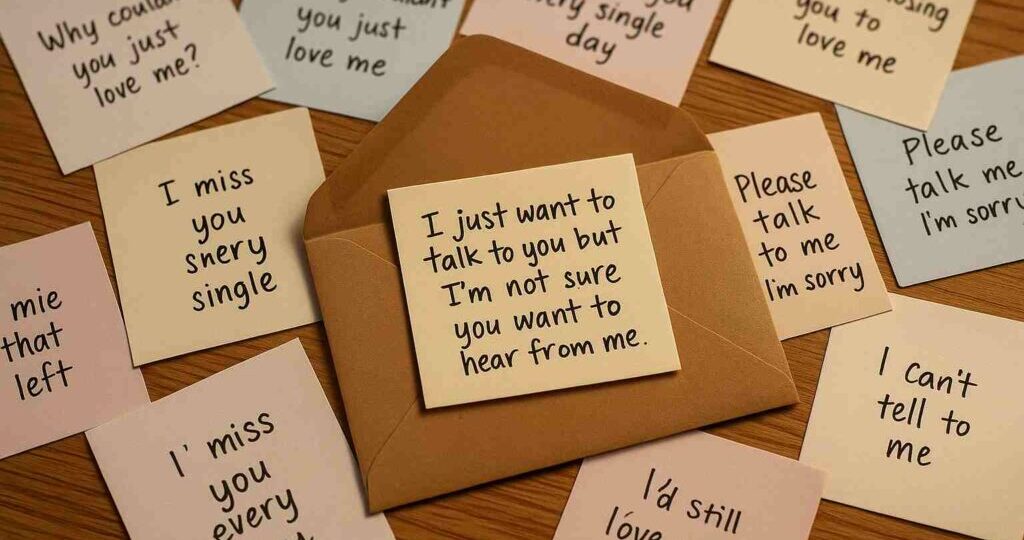Why Writing Unsent Messages Can Improve Mental Health
October 20, 2025 | by IoT Development Company

Introduction
We live in a world where communication happens instantly. Texts, DMs, and voice notes allow us to express ourselves at any time. Yet, there are still moments when words remain unsent. Whether it is fear, pride, or timing, some thoughts never reach the person they were meant for.
But what happens when we write those words down anyway — without ever sending them?
That simple act is known as writing unsent messages, and it has quietly become a powerful form of emotional therapy. From journals to projects like The Unsent Project, thousands of people are discovering how expressing their feelings privately can lead to real mental clarity and healing.
This article explores why writing unsent messages can improve mental health, backed by psychology, emotional research, and human experience.
1. Writing Releases Suppressed Emotions
When emotions are bottled up, they do not disappear — they build pressure inside. Over time, unspoken thoughts can lead to anxiety, sleeplessness, and even physical tension. Writing an unsent message provides a healthy outlet for those emotions.
Psychologists call this technique expressive writing. It allows you to put your thoughts into words without the fear of judgment or consequence. By writing down what you truly feel, your brain begins to organize chaotic emotions into something you can understand.
It is not about perfect grammar or structure. It is about releasing emotional weight that talking sometimes cannot.
2. It Creates Safe Emotional Distance
When we are hurt or angry, it is easy to react impulsively. Sending a message in the heat of emotion can make situations worse. Writing an unsent message gives you space to reflect instead of react.
This process allows the emotional intensity to settle. You can revisit what you wrote later, read it from a calmer mindset, and often realize you no longer feel the same way. That distance helps you respond wisely rather than emotionally in real situations.
By creating space between thought and action, you give yourself the power to heal rather than harm.
3. It Helps You Understand Your True Feelings
Sometimes, we do not even know what we are feeling until we write it down. Thoughts swirl in the mind, but writing gives them shape. It is like holding up a mirror to your inner self.
Unsent messages make those hidden emotions visible. You begin to see patterns in your pain or clarity in your confusion. Maybe you realize you miss the person, or maybe you realize you do not — either way, you are gaining emotional awareness.
That awareness is the foundation of better mental health. When you know your feelings, you can manage them instead of letting them control you.
4. Writing Builds Emotional Resilience
Each time you write an unsent message, you are teaching your mind a valuable skill — how to process emotions instead of running from them. Over time, this builds emotional resilience.
Life will always bring challenges, heartbreaks, and misunderstandings. But when you have a private space to release those emotions safely, they lose their power to overwhelm you. You learn that you can survive discomfort without needing to escape or explode.
Writing becomes your emotional anchor — a reminder that you are stronger than your feelings.
5. It Offers Closure Without Confrontation
Many people turn to unsent messages when closure is impossible. Maybe the person is gone, unavailable, or unwilling to talk. Writing what you wish you could say helps you find peace on your own terms.
Closure does not always require another person. Sometimes it comes from accepting the story as it is and letting go of what cannot be changed. Writing allows you to express regret, forgiveness, and love freely — even when no one else will ever read it.
That simple act of expression can lift years of emotional weight.
6. It Reduces Stress and Anxiety
Studies on expressive writing show that releasing emotions through writing can lower stress levels and improve overall mental health. When you write your worries down, your brain interprets it as a form of problem-solving.
Writing unsent messages is like cleaning emotional clutter. Instead of replaying negative thoughts over and over, you transfer them to paper or screen. Your mind feels lighter, clearer, and calmer.
This technique is especially powerful at night, when racing thoughts often keep people awake. Writing before bed can create a sense of mental stillness and emotional safety.
7. It Encourages Forgiveness and Letting Go
Forgiveness is often misunderstood. It does not mean excusing what someone did — it means freeing yourself from the burden of carrying it.
Writing unsent messages allows you to express every emotion — anger, sadness, or disappointment — until there is nothing left but understanding.
By giving those emotions a voice, you eventually reach a place of peace. You realize that holding on only hurts you, and that letting go is an act of self-kindness.
Forgiveness often starts on paper long before it happens in real life.
8. It Strengthens Self Awareness and Growth
Every unsent message tells a story about who you were in that moment — vulnerable, confused, hopeful, or strong. When you look back at those writings later, you see how much you have grown.
You may notice that what once broke you no longer does. You may realize that you have learned boundaries, patience, or acceptance.
This reflection helps you track emotional progress — a powerful motivator for continued self growth.
Your unsent words become proof that healing is possible.
9. It Provides Emotional Privacy
In a world obsessed with sharing everything, private writing gives your emotions a safe home. You do not need likes, replies, or validation to make your feelings real. The privacy of an unsent message protects you from misinterpretation and judgment.
It is your emotional space — honest, unfiltered, and sacred. You can write whatever you want, knowing no one else will see it. That freedom allows deeper honesty than public sharing ever could.
True healing often begins when you no longer need to be seen to feel understood.
10. It Connects You With Shared Humanity
Though unsent messages are personal, they also reveal something universal — everyone feels deeply, everyone struggles, and everyone heals in their own way.
Projects like The Unsent Project show that across languages and cultures, human emotion is remarkably similar. Whether the message says “I miss you,” “I’m sorry,” or “I’m finally okay,” it reminds us that we are never alone in our feelings.
This understanding builds compassion — both for ourselves and for others.
How to Start Writing Your Own Unsent Messages
If you want to try this practice yourself, here is a simple way to begin:
-
Find a quiet place and open a notebook or notes app.
-
Address your message to someone you wish you could talk to.
-
Write freely — no editing, no filtering, just honesty.
-
When finished, read it once. Then decide: keep it, delete it, or even burn it.
-
Notice how your body feels after. You will likely feel lighter, calmer, and more centered.
The goal is not to send the message — it is to release the emotion behind it.
Final Reflection
Writing unsent messages is more than just a creative exercise. It is a form of self therapy — a private conversation with your own heart.
It allows you to understand, express, and release what you cannot always say aloud. Each message you write is a small act of courage and healing.
You may never send those words, but they still serve their purpose — they free you.
When you give your feelings a voice, even silently, you reclaim your peace.
RELATED POSTS
View all



